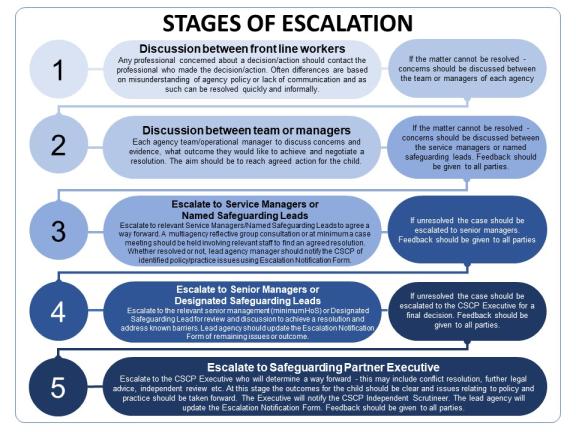The purpose of this policy is to explain what to do when any professional has a concern or disagreement with another agency’s decision or action related to a child. It aims to keep the focus on the child’s safety and well-being by promoting a culture of professional challenge and providing the framework for timely and effective resolutions.
Working Together 2023 states that 'clear escalation policies for staff to follow when their child safeguarding concerns are not being addressed within their organisation or by other agencies’ should be in place. Similarly, Keeping Children Safe in Education promotes that - ‘if, after a referral, the child’s situation does not appear to be improving, the referrer should consider following the local escalation procedures’. This policy therefore relates to the multi-agency children’s workforce working with children and families receiving support and services at Early Help, Child in Need, Child Protection, and Looked After Children. This policy should be read in conjunction with the London Child Protection Procedures, Part B1 Chapter 11 ‘Professional Conflict Resolution’.
This policy does not replace the need for single-agency dispute resolution procedures which should be in place to manage disputes on decisions between internal services (such as Children’s Social Care CERPs).
Nor is this policy a complaint policy – if there is a complaint about professional conduct or a particular single agency policies should be followed. If the complaint is about the decisions of the Croydon Safeguarding Children Partnership, it should be directed to the CSCP Executive Group who should alert the CSCP Independent Scrutineer.
This Escalation and Resolution Policy promotes both an informal (Stages 1- 2) and formal (Stages 3 -5) approach to resolving issues that arise.
This policy is reviewed biennially by the CSCP Quality Improvement Group.

